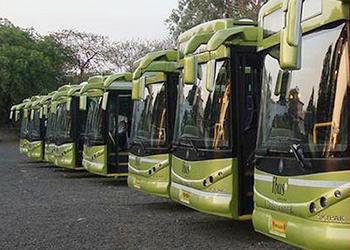
INDORE, India, July 28, 2014 (ENS) – City of Indore officials Friday agreed to work with the World Business Council for Sustainable Development to implement sustainable mobility solutions in the city with the latest technologies, systems and management approaches to improve transportation and enhance the quality of life.
Sustainable mobility, not only for Indore but also for cities throughout the world, was in the spotlight as Indore officials met with delegates of the WBCSD’s Sustainable Mobility Project (SMP2.0) and representatives of its supporting companies.
The meeting was held to advance SMP2.0, a worldwide project that brings together a global cross-sector group of mobility-related companies to accelerate progress toward “universal access to safe and low-impact mobility” for goods and for people.

With about 2.1 million people, Indore is the largest city and the commercial capital of the central Indian state of Madhya Pradesh.
In 2013, the Sustainable Mobility Project nominated six cities as demonstrator cities to develop a roadmap for sustainable mobility involving the city government and related stakeholders.
Based on its desire to deliver more sustainable mobility solutions, Indore was nominated as one of these six demonstrator cities with the participation of BMW, Ford, Fujitsu, Volkswagen and the Portuguese motorway operation and maintenance company Brisa.
On Friday, the Atal Indore City Transport Service Ltd., which operates the city’s public transport system, signed a memo of understanding with the World Business Council for Sustainable Development to prepare a future mobility plan for the city’s SMP2.0 project.
Mayor Krishna Murari Moghe said, “Indore is a rapidly developing city with fast growing development. We are committed to provide an efficient, reliable, safe and affordable public transport system in Indore, along with the inter-multimodal transport system, to improve mobility.”
“We shall give our full support to WBCSD for this project and make sure we achieve our objectives,” said Moghe.
The goal of the SMP2.0 project is to develop cities where the automobile is only one element of a broader transportation ecosystem.
The vision is for pedestrian, bicycle, private car, commercial and public transportation to be woven into connected networks that save time, conserve resources, lower emissions and improve safety.
During the Indore meeting, Michael Fahy, director of the WBCSD Sustainable Mobility Project said, “By working with leading cities such as Indore, this project will help cities move towards improving sustainable mobility for all.”
“By facilitating the movement of people and goods,” Fahy said, “the project has the potential to have a real positive impact on people’s lives, the environment and the economy.”

By 2050, 70 percent of the world’s population will live in cities, where the keys to a sustainable future for humanity can be found.
City governments around the world are preparing to face this challenge by pursuing ambitious sustainability visions to become more competitive, resource efficient, resilient and inclusive.
The World Business Council for Sustainable Development’s Vision 2050 defines the sustainable mobility goal as “near universal access to reliable and low carbon mobility, infrastructure and information.”
Achieving this aim requires major transformations in urban infrastructure systems, including mobility, which provides access to basic needs such as health, employment and education.
Together with the Indore City authorities, people with the SMP2.0 project will help address mobility-related challenges and develop a set of multimodal solutions that will extend access to safe, reliable and comfortable mobility for all, while aiming for affordability, zero traffic accidents, low environmental impact, and reduced demand on energy and time.
Member companies of the Sustainable Mobility Project are: BMW, BP, Bridgestone, Brisa, Daimler, Deutsche Bahn, Ford, Fujitsu, Honda, Michelin, Nissan, Pirelli, Shell, Toyota, Volkswagen.
© 2014, Environment News Service. All rights reserved. Content may be quoted only with proper attribution and a direct link to the original article. Full reproduction is prohibited.
